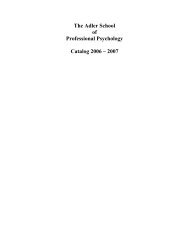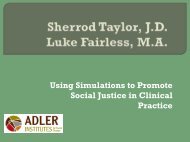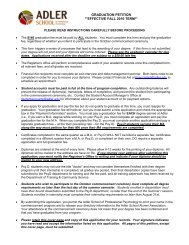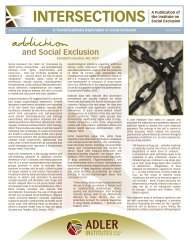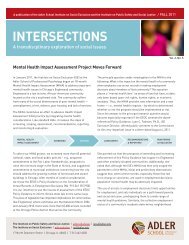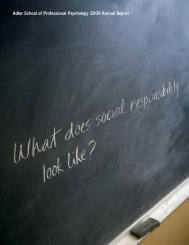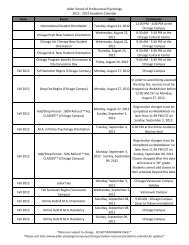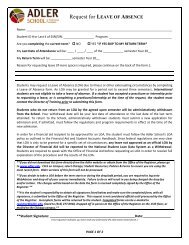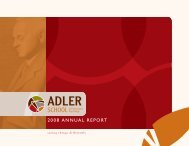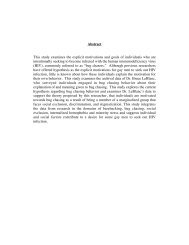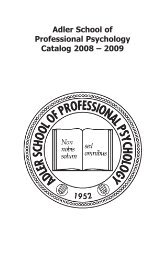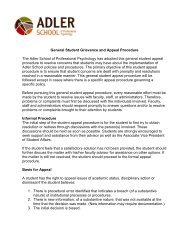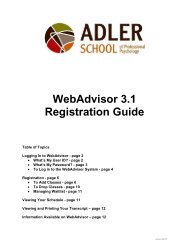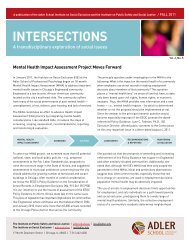It's been a good year - Adler School of Professional Psychology
It's been a good year - Adler School of Professional Psychology
It's been a good year - Adler School of Professional Psychology
Create successful ePaper yourself
Turn your PDF publications into a flip-book with our unique Google optimized e-Paper software.
Meeting ambitious goals. Preparing greater<br />
numbers <strong>of</strong> future practitioners. Building new<br />
support, and being nationally recognized for<br />
our advocacy, practice, and approaches.<br />
In these challenging times, these are things<br />
to be proud <strong>of</strong>. And we are.<br />
At the <strong>Adler</strong> <strong>School</strong>, we can truly say we apply<br />
the values we hold—social interest, pluralism,<br />
courage, excellence, pragmatism—to ourselves<br />
and our performance. It’s how we’ve sustained<br />
focused intensity and forward motion the past<br />
<strong>year</strong>—following the success <strong>of</strong> the <strong>year</strong> before<br />
that, and the <strong>year</strong> before that.<br />
It’s <strong>been</strong> a <strong>good</strong> <strong>year</strong> for the <strong>Adler</strong> <strong>School</strong>.<br />
And what’s important about that is the “why.”<br />
+1
Not for<br />
ourselves<br />
alone but<br />
for all.<br />
Non nobis solum sed omnibus. Not for ourselves<br />
alone but for all. Our <strong>School</strong> motto, it’s the<br />
context for what we do.<br />
Today’s social challenges demand highly<br />
trained, relevant, and inventive practitioners<br />
to address them. No other institution prepares<br />
practitioners in the particular way that the<br />
<strong>Adler</strong> <strong>School</strong> prepares socially responsible<br />
practitioners—because we are uniquely and<br />
specifically informed by Alfred <strong>Adler</strong>’s rulebreaking,<br />
revolutionary ideas and constructs.<br />
Gemeinschaftsgefühl—<strong>Adler</strong>’s concept <strong>of</strong> social<br />
interest, or the relationship between health and<br />
community—is the smartest, the most effective,<br />
and the most efficient way to initiate the work<br />
<strong>of</strong> social justice and the work <strong>of</strong> practitioners<br />
in communities.<br />
It is essential, today more than ever, and it is<br />
how and why <strong>Adler</strong> <strong>School</strong> students, faculty, and<br />
graduates are addressing complex, extraordinary<br />
challenges throughout the world. In urban<br />
communities that have limited access to basic<br />
human needs and rights such as health and<br />
safety. In provinces where most people enter<br />
the mental health system through emergency<br />
rooms and police intervention—neither sector<br />
traditionally trained in mental health. In the<br />
world’s poorest countries recovering from<br />
war without any mental health care. In the<br />
United States where people are incarcerated at<br />
staggering human, societal, and economic cost.<br />
I feel great responsibility for the <strong>Adler</strong> <strong>School</strong><br />
to continually improve our curricula, learning<br />
outcomes, teaching, service, and initiatives<br />
every term and every <strong>year</strong>—because socially<br />
responsible practitioners are indispensable to<br />
addressing these challenges. Their magnitude and<br />
the opportunity they present for social change<br />
motivate us to advance our work and our vision.<br />
It’s <strong>been</strong> a <strong>good</strong> <strong>year</strong> for advancing our work and<br />
our vision—not for ourselves alone but for all.<br />
Raymond E. Crossman, Ph.D.<br />
President<br />
3
THERE ARE 500,000 SURVIVORS OF TORTURE<br />
IN THE U.S. 17,000 lIVE IN CHICAgO.<br />
It’s <strong>been</strong> a <strong>good</strong> <strong>year</strong> for celebrating<br />
the resiliency <strong>of</strong> the human spirit.<br />
“In the long months <strong>of</strong> confinement, I <strong>of</strong>ten thought <strong>of</strong> how to transmit the<br />
pain that a tortured person undergoes. And I always concluded that it was<br />
impossible.” JACObO TImERmAN, Prisoner without a Name, Cell without a Number<br />
“In all ways in which we understand it to affect people, torture is used<br />
to destroy the human spirit. It is designed to break down the victims’<br />
personalities and strip them <strong>of</strong> the power to control even their own lives.<br />
“The long-term impact <strong>of</strong> the loss <strong>of</strong> connection to one’s previous self and<br />
community is pr<strong>of</strong>ound. For refugees, that loss is only exacerbated by their<br />
physical displacement to a new and unfamiliar setting.”<br />
During Nancy Bothne’s career in human rights-based advocacy at Amnesty<br />
International, she saw in torture survivors “the resiliency <strong>of</strong> the human spirit.”<br />
The experience was life-affirming and life-changing.<br />
Her work and interest in how communities could recover from periods <strong>of</strong><br />
human rights trauma led her to teaching at the <strong>Adler</strong> <strong>School</strong>. Here, she<br />
partnered with the Heartland Alliance Marjorie Kovler Center to create a<br />
two-semester course, introduced at the <strong>Adler</strong> <strong>School</strong> in fall 2010, on<br />
community-based interventions with torture survivors.<br />
“Torture survivors need to rebuild their sense <strong>of</strong> self and their relationships<br />
with others. They need to reestablish a sense <strong>of</strong> safety in dealing with a<br />
community. It was important to me that our course would benefit survivors<br />
and engage them in processes that both valued and used their culture,<br />
experiences, and knowledge.<br />
“The first semester was really designed to prepare students and give them<br />
a theoretical foundation. The second semester was organized around<br />
experiential learning. Students and survivors met weekly in what we called<br />
5
6<br />
‘learning circles,’ where we talked about common cultural or personal<br />
experiences, say, childhood games or what country you’d like to go to that<br />
you’ve never <strong>been</strong> to.<br />
+ “These sessions were fun, but they also helped identify the challenges that<br />
survivors encounter in daily life, and promoted sharing ideas and strength-<br />
based problem-solving.<br />
“One <strong>of</strong> the survivors had a birthday coming up. We thought we might talk<br />
about birthdays and how we celebrate them. Birthdays are significant<br />
demarcations <strong>of</strong> passages <strong>of</strong> our lives: being old enough to go to school, for<br />
instance, or coming <strong>of</strong> age. In that sense, these birthdays can be particularly<br />
difficult for people who are no longer in their own country.<br />
“One survivor said that she didn’t celebrate her birthday, that she could no<br />
longer celebrate. So we asked if we could celebrate it, and she said yes.<br />
“One <strong>of</strong> our students, Christina, prepared extensively for the birthday party.<br />
She decorated the room, brought in special food. She made it clear to all that<br />
it was a special and significant day. Then she stood up and sang the Mexican<br />
birthday song to the survivor.<br />
“It was an amazing moment. Christina was obviously giving the love, and the<br />
survivor was obviously feeling the love. She picked her head up <strong>of</strong>f the table,<br />
she established eye contact, she smiled, she laughed. It was a deeply<br />
moving moment.”<br />
NANCY bOTHNE, m.A., m.S., Director <strong>of</strong> Community Engagement, developed “Community-<br />
based Interventions for Torture Survivors” in collaboration with the Kovler Center. Offered<br />
for the first time in 2010-2011, the course was co-taught with Mary Fabri, Psy.D., the<br />
Kovler Center’s senior director <strong>of</strong> torture treatment services and international training.<br />
El día en que tu naciste,<br />
nacieron todas las flores;<br />
En la pila del bautismo,<br />
cantaron los ruiseñores.<br />
“I didn’t want to just sing her the American birthday song.<br />
All it is, is ‘Happy birthday to you,’ over and over. The<br />
Mexican song says, ‘When you were born, all the flowers<br />
were born. All the birds sang.’ That’s what I wanted her<br />
to know. That’s what I wanted to give her.”<br />
CHRISTINA glORIA, Doctor <strong>of</strong> <strong>Psychology</strong> in Clinical <strong>Psychology</strong> student
IN THE U.S., 1 IN EVERY 32 AdUlTS IS EITHER IN<br />
PRISON, IN JAIl, ON PAROlE, OR ON PRObATION.<br />
It’s <strong>been</strong> a <strong>good</strong> <strong>year</strong> for affirming<br />
the human need to connect.<br />
The United States leads the world in producing prisoners. Currently, 2.4 million<br />
adults are in prison or in jail. Another 4.9 million are on parole or probation.<br />
That’s one in every 32 adults. The cost to the U.S. budget is $238 billion a<br />
<strong>year</strong>. The cost to families <strong>of</strong> victims and prisoners alike is incalculable.<br />
“In prison, they say they're ‘out <strong>of</strong> the world.’<br />
“Think about that. If you’re ‘out <strong>of</strong> the world,’ you are totally disconnected.<br />
The humanness <strong>of</strong> who you are is lost, and it can lead to you not treating<br />
others as human beings.”<br />
Nancy Tartt is pursuing her M.A. in Marriage and Family Counseling. For her<br />
Community Service Practicum—a non-clinical, community-based practicum<br />
taken by all <strong>Adler</strong> <strong>School</strong> students—she worked in the Cook County Public<br />
Defender’s Office.<br />
There, she was asked to collect a family history from a man charged with<br />
first-degree murder.<br />
Every week for more than six months, Tartt met with “John” in jail. She spoke<br />
to him about his life and relationships. She interviewed his family members,<br />
including his father, who was being held in the same jail.<br />
She constructed a detailed genogram, a graphic representation <strong>of</strong> the impact<br />
<strong>of</strong> family and social history—roles, relationships, patterns <strong>of</strong> behavior—on the<br />
individual, and shared it with John and the public defender.<br />
For the attorney, who presented it to the prosecution as part <strong>of</strong> the plea<br />
bargaining process, the genogram was a novel tool to be used in the<br />
complicated operation <strong>of</strong> seeking justice. For John, it <strong>of</strong>fered a new<br />
perspective on his life—along with the hours <strong>of</strong> conversation with Tartt.<br />
9
10<br />
“We need to broaden the definition <strong>of</strong> therapy and therapeutic settings,”<br />
Tartt says. “I engaged him in discussions about his family and experiences.<br />
He started connecting the dots <strong>of</strong> his family dynamics and life experiences.<br />
He began writing to his father, who had <strong>been</strong> trying unsuccessfully to<br />
communicate with him. They started having a relationship again. His brother<br />
started contacting him a little bit more.<br />
“These are the kind <strong>of</strong> things that happen in therapy. We’re not trying to make<br />
+<br />
angels, and these aren’t miracles. But there’s so much that we could do.<br />
From an <strong>Adler</strong>ian perspective, an individual needs to be the best person that<br />
he or she can be, wherever that is.<br />
“Seeing a person who has committed a crime as a human being doesn’t<br />
excuse the crime. It doesn’t give him permission to be in denial about what<br />
he did. It’s not about guilt or innocence. It’s about pr<strong>of</strong>essing a standard <strong>of</strong><br />
living. At the end <strong>of</strong> the day, we’re humans, and we are here with each other<br />
to contribute to the betterment <strong>of</strong> mankind.<br />
“I have decided to continue this work impacting the lives <strong>of</strong> those ‘outside the<br />
world.’ The impact is too important to just let it go.”<br />
NANCY TARTT completed her Community Service Practicum (CSP) as one <strong>of</strong> more than<br />
200 such practicums undertaken by <strong>Adler</strong> <strong>School</strong> students in 2010–2011—contributing<br />
to more than 600,000 hours <strong>of</strong> <strong>Adler</strong> <strong>School</strong> students’ direct work with communities<br />
and agencies to address systemic improvements to mental health.
IN bRITISH COlUmbIA, 80% OF PEOPlE ENTERINg<br />
THE mENTAl HEAlTH SYSTEm ENTER VIA POlICE<br />
INTERVENTION ANd EmERgENCY WARdS.<br />
30%<br />
police<br />
intervention<br />
20%<br />
other<br />
50%<br />
emergency wards<br />
It’s <strong>been</strong> a <strong>good</strong> <strong>year</strong> for integrating<br />
systems to address mental health.<br />
In Vancouver’s Downtown Eastside, annual per capita income hovers below the<br />
poverty line. Rates <strong>of</strong> tuberculosis, hepatitis C, and HIV/AIDS exceed those in<br />
Botswana, Africa. Fully 75 percent <strong>of</strong> Downtown Eastside residents surveyed<br />
report health problems, including drug and alcohol addiction, fetal alcohol<br />
syndrome, and brain injury.<br />
With 50 percent <strong>of</strong> police calls from the area involving mental health issues,<br />
British Columbia’s division <strong>of</strong> the Canadian Mental Health Association<br />
decided it was time to <strong>of</strong>fer crisis intervention training to first responders.<br />
Natalie DeFreitas, then an <strong>Adler</strong> <strong>School</strong> student with extensive experience in<br />
corrections, undertook a practicum as part <strong>of</strong> the training team.<br />
“The issues faced by people living in the Downtown Eastside are<br />
predominately mental health issues and concurrent disorders. People who<br />
have mental health issues end up, say, with addictions, which then lead them<br />
to criminal justice issues. It’s all stemming from an original issue that was<br />
probably left untreated from a very young age.<br />
“In these circumstances, risk assessment is an incredibly important tool for<br />
first responders. They need to be able to observe symptoms and properly<br />
assess whether a person presents a risk to themselves or others.<br />
“First responders are trained in safety, proper apprehension, and justicerelated<br />
procedures. They see the outward expression <strong>of</strong> an addiction or<br />
behavioral issue, but they might not understand whether or not a person<br />
poses a suicide risk, for example. We provided information on common<br />
underlying mental health issues and how those issues present.<br />
“No one expects a first responder to provide a diagnosis. Training helps them<br />
use intuition, visual cues, and audial cues to become aware <strong>of</strong> things to<br />
13
14<br />
+<br />
report back to the person who does have some diagnostic skill. The hope is<br />
that instead <strong>of</strong> apprehending someone and putting him or her in a jail cell for<br />
a couple <strong>of</strong> hours, a police <strong>of</strong>ficer can know to accompany that person to<br />
the ER.<br />
“To be able to say, ‘I noticed that this person had some delusions <strong>of</strong> grandeur’<br />
might be important for a psychiatrist in the emergency room to know. The<br />
training put everyone in the same room: triage doctors, ER nurses, [Royal<br />
Canadian Mounted Police] <strong>of</strong>ficers, ambulance drivers, firefighters.<br />
“One <strong>of</strong> the things that came out <strong>of</strong> our training was the development <strong>of</strong> a<br />
form for <strong>of</strong>ficers and others to carry with them and pass on to the triage<br />
doctors. The doctors complete it, place it in the patient file, and then send<br />
it on to whomever they refer the patient.<br />
“We heard from everyone that there needed to be collaboration and<br />
communication among all <strong>of</strong> those who have contact with and treat those<br />
who are suffering from mental health issues. The training was one step in<br />
developing that collaboration, in trying to work with one another to establish<br />
a continuum <strong>of</strong> care.”<br />
NATAlIE dEFREITAS received her Master <strong>of</strong> Arts in Counselling <strong>Psychology</strong> from the<br />
<strong>Adler</strong> <strong>School</strong>’s Vancouver campus in 2010. She is currently at work on a white paper<br />
and summary <strong>of</strong> best practices in restorative justice in Vancouver and Chicago, for the<br />
<strong>Adler</strong> <strong>School</strong>’s Institute on Public Safety and Social Justice.
IN CHICAgO'S lOW-INCOmE ENglEWOOd<br />
COmmUNITY, VACANT HOUSINg UNITS HAVE<br />
INCREASEd bY 83% OVER THE lAST 12 YEARS.<br />
1,916<br />
1999<br />
2,591<br />
2000<br />
3,500+<br />
2011<br />
It’s <strong>been</strong> a <strong>good</strong> <strong>year</strong> for advancing<br />
policy that improves communities.<br />
The streets <strong>of</strong> Chicago’s Englewood community are lined with well-built<br />
bungalows and solid greystones. Yet, 3,500 <strong>of</strong> those properties sit empty.<br />
It is the highest concentration <strong>of</strong> vacant buildings in the city, and it exacts<br />
a frightening toll on residents <strong>of</strong> this low-income, high-crime neighborhood.<br />
In July 2011, Lynn Todman, Ph.D., urban planner and Executive Director <strong>of</strong><br />
the <strong>Adler</strong> <strong>School</strong>’s Institute on Social Exclusion (ISE), testified before a City<br />
Council joint committee on Housing & Real Estate and Zoning on a proposed<br />
amendment to the city’s vacant property ordinance to hold banks responsible<br />
for securing and maintaining foreclosed properties. Dr. Todman had prepared<br />
a policy brief for Alderman Pat Dowell on the issue, summarizing the results<br />
<strong>of</strong> the ISE’s first-<strong>of</strong>-its-kind Mental Health Impact Assessment (MHIA) project.<br />
As a vote on the amendment drew near, Dowell asked Dr. Todman to share<br />
her research.<br />
“The ideas that I <strong>of</strong>fer you today come from work that I have done in the<br />
Englewood community, which as you all know, has more than its fair share<br />
<strong>of</strong> unsecured, unmaintained, vacant, and foreclosed buildings.<br />
“About a <strong>year</strong> ago, after Alderman Dowell crafted the amendments<br />
that you have under consideration, my staff and I began to look at how<br />
the proposed changes in the code might impact mental health in the<br />
Englewood community.<br />
“To do this, we conducted an abbreviated Mental Health Impact Assessment<br />
(MHIA) in which we examined how foreclosed properties, with overgrown<br />
grass and shrubbery and littered yards, might affect the mental health and<br />
well-being <strong>of</strong> the community’s residents.<br />
“We conducted an in-depth review <strong>of</strong> the literature, and we spoke personally<br />
with Englewood residents and service providers. Our sources included the<br />
17
18<br />
staff <strong>of</strong> Teamwork Englewood, Imagine Englewood—IF, the Chicago and<br />
Illinois departments <strong>of</strong> public health, the Centers for Disease Control and<br />
Prevention, Neighborhood Housing Services, and the Illinois Institute <strong>of</strong><br />
Public Health.<br />
“Unsecured and unmaintained vacant buildings are magnets for all kinds <strong>of</strong><br />
+<br />
criminal activity—they attract drug dealers, rapists, gangs, and arsonists. We<br />
learned that securing and maintaining foreclosed properties would result in<br />
fewer havens for such criminal activity, and would, as a result, reduce the<br />
fear, stress, and anxiety associated with living near these properties or having<br />
to walk by them every day on the way to work or to school.<br />
“For property owners who do live in the community, the amendments could<br />
also help to reduce the stress associated with watching one’s principle—if not<br />
only—asset decline in value…. By increasing safety, the amendments could<br />
also play a role in making many hard-hit communities more attractive places<br />
for business investment, job development, and employment opportunities.<br />
“Based on the information we gathered, we sent a policy letter, which<br />
supplements my testimony here today, showing that these amendments would<br />
have positive impacts on the health and well-being <strong>of</strong> Englewood and similarly<br />
situated communities. Moreover, by positively impacting the health and wellbeing<br />
<strong>of</strong> city residents, these legal modifications can also help to strengthen<br />
Chicago’s workforce and bolster its economic competitiveness.”<br />
lYNN TOdmAN, PH.d., urban planner and ISE Executive Director, testified days before<br />
the City Council passed the amendment on July 28. Meanwhile, under Dr. Todman’s<br />
direction, the ISE has launched a comprehensive MHIA to bring greater focus on issues <strong>of</strong><br />
unemployment plaguing Englewood. For information, visit adler.edu/MHIA.
+<br />
+<br />
graduating socially<br />
responsible practitioners<br />
engaging communities<br />
advancing social justice<br />
continues the pioneering<br />
work <strong>of</strong> Alfred <strong>Adler</strong>, the first<br />
community psychologist<br />
It’s <strong>been</strong> a <strong>good</strong> <strong>year</strong> for<br />
advancing the mission.<br />
Innovating to lead change is part <strong>of</strong> what<br />
the <strong>Adler</strong> <strong>School</strong> does best. As the past <strong>year</strong><br />
proves, we have become known for it.<br />
For example, for outstanding contributions<br />
in education, advocacy, and public interest,<br />
the <strong>Adler</strong> <strong>School</strong> was honored by the<br />
National Council <strong>of</strong> <strong>School</strong>s and Programs<br />
in Pr<strong>of</strong>essional <strong>Psychology</strong> with its Advocacy<br />
Award. The <strong>School</strong> also again earned a spot on<br />
the President’s Higher Education Community<br />
Service Honor Roll—the highest federal<br />
acknowledgment <strong>of</strong> an institution’s dedication<br />
to community engagement.<br />
In online blended education, the <strong>Adler</strong> <strong>School</strong><br />
was recognized for pioneering new best<br />
practices. The recognition came from the Sloan<br />
Consortium, the higher education association<br />
that focuses on the nation’s best <strong>of</strong> the best in<br />
technology and education.<br />
The <strong>Adler</strong> <strong>School</strong> also earned an important<br />
designation for its forward-thinking approach<br />
to a new master’s program focused on<br />
rehabilitation counseling—becoming the first<br />
pr<strong>of</strong>essional school <strong>of</strong> psychology to receive<br />
accreditation for such a program by the Council<br />
on Rehabilitation Education.<br />
Recognitions like these and many more validate<br />
that the <strong>Adler</strong> <strong>School</strong> leads in innovation—a<br />
value embedded into the <strong>School</strong>’s ambitious<br />
2010-2015 Strategic Plan. With this innovation—<br />
and the passion, collaboration, and action for<br />
which the <strong>Adler</strong> <strong>School</strong> community is also<br />
known—the <strong>School</strong> has met every first-<strong>year</strong> goal<br />
established through the plan’s four key strategies<br />
to advance the <strong>Adler</strong> <strong>School</strong> mission. The result<br />
is leading change for socially responsible practice,<br />
healthy communities, and a more just society.<br />
Like my colleagues on the Board <strong>of</strong> Trustees,<br />
I am excited and honored to be part <strong>of</strong> it.<br />
Mary J. Cahillane<br />
Chair, Board <strong>of</strong> Trustees<br />
21
For advancing<br />
social responsibility<br />
bEgUm VERJEE, Ed.d., Program Director <strong>of</strong> the M.A. in Community <strong>Psychology</strong> program, Vancouver campus —among the new<br />
<strong>Adler</strong> <strong>School</strong> programs launched in 2010-2011.<br />
“The original idea for our program came from our<br />
advisory board, which consists primarily <strong>of</strong> people<br />
who work in the public sector. They said there’s a<br />
great need for master’s level study in community<br />
development. Many marginalized communities face<br />
enormous barriers and social problems, but there’s an<br />
enormous strength there, too. We need people who<br />
can honor these strengths and work with communities<br />
for social change.<br />
“I met with several people, including executive<br />
directors <strong>of</strong> community-based organizations, with<br />
government <strong>of</strong>ficials, with people in education. I<br />
asked them if they saw a need for a graduate-level<br />
degree in this area. The community consultation<br />
came back with a resounding ‘yes.’ In addition, they<br />
suggested that such a program be created from a<br />
community-development framework.<br />
“There are a lot <strong>of</strong> community-based organizations<br />
doing really <strong>good</strong> work addressing some <strong>of</strong> the barriers<br />
that individuals and communities face. But, we can<br />
go further if we work together through communityuniversity<br />
collaborations, especially if we’re talking<br />
about creating change at the policy level. That<br />
means connecting individuals and communities to<br />
decision-makers.<br />
“One <strong>of</strong> the things I say to my students all the time<br />
is, ‘Think about politics.’ We have a student right<br />
now doing her community service placement with a<br />
city counsellor who told her, ‘Please consider politics<br />
as a career option.’ Some people go into politics<br />
for the acquisition <strong>of</strong> power. But there are also<br />
politicians who, I believe, are community psychology<br />
practitioners. They’re working for the people with<br />
the people, and that’s exactly what community<br />
psychology is.<br />
“Community psychology is not about doing for or<br />
speaking for communities. It is about working with<br />
communities and ensuring that they have a voice<br />
in the changes necessary for their vision <strong>of</strong> an<br />
accessible and equitable world.”<br />
STRATEgIC PlAN: KEY STRATEgY 1<br />
+ Expand and align education<br />
and community engagement<br />
with social responsibility.<br />
2011 gOAl SET<br />
Launch two new academic programs in Chicago and one new academic<br />
program in Vancouver, and further refine our core organizational competency<br />
<strong>of</strong> socially responsible practice.<br />
2011 gOAl mET<br />
Three new academic programs—two in Chicago and one in Vancouver—have<br />
significantly expanded the <strong>Adler</strong> <strong>School</strong>’s pr<strong>of</strong>essional education <strong>of</strong>ferings to<br />
address community needs and promote socially responsible practice.<br />
In September 2010, the Chicago campus began <strong>of</strong>fering a new Master <strong>of</strong><br />
Arts in Counseling <strong>Psychology</strong>, Specialization in Forensic <strong>Psychology</strong>, to<br />
prepare practitioners both within and beyond the criminal justice system. A<br />
new Master <strong>of</strong> Arts in Counseling <strong>Psychology</strong>, Specialization in Sport and<br />
Health <strong>Psychology</strong>, uniquely focuses sports psychology on heath, wellness,<br />
and prevention. In January 2011, the new Master <strong>of</strong> Arts in Community<br />
<strong>Psychology</strong> program in Vancouver began preparing leaders for the<br />
government and community agency sectors.<br />
Throughout the <strong>year</strong>, faculty, staff, students, alumni, and partners across<br />
both campuses collaborated in different ways in the Socially Responsible<br />
Practice Project, a <strong>year</strong>-long project to reflect upon and align the <strong>School</strong>’s<br />
core organizational competency <strong>of</strong> socially responsible practice. The<br />
completed project led to a white paper that will be published in fall 2011.<br />
2012 gOAl SET<br />
Launch two new academic programs at Chicago campus.<br />
23
For advancing<br />
academic excellence<br />
bIll EPPERlY, PH.d., Director <strong>of</strong> the Center for Learning and Teaching at the <strong>Adler</strong> <strong>School</strong>—newly established this <strong>year</strong>.<br />
“My goal for the Center is to advance the learning<br />
<strong>of</strong> every single student and faculty member, taking<br />
each <strong>of</strong> them one step farther than they might have<br />
gone otherwise.<br />
“We look for impact points, areas in which we can<br />
help transform the experiences <strong>of</strong> learning and<br />
teaching. Our suite <strong>of</strong> writing supports for students<br />
is one such impact point. Some students with the<br />
most interesting combinations <strong>of</strong> experience and<br />
aptitude aren’t necessarily the most well-prepared<br />
for graduate study. Their past experience was with<br />
a system <strong>of</strong> education that nearly kept them from<br />
achieving their goals.<br />
“Or perhaps they are international students, and<br />
have a different approach to their course readings<br />
and academic work in general. They might not see<br />
theory as something that can be rejected or disagreed<br />
with. They might not be comfortable coming directly<br />
to the point. We give such students the resources<br />
they need to be successful.<br />
“We also encourage students to publish their work.<br />
Theory has always informed practice. The opposite<br />
should also be true. It should be a continuous<br />
loop. I like to think that <strong>Adler</strong> <strong>School</strong> students will<br />
make innovative contributions to the literature, by<br />
contributing new applications <strong>of</strong> theory and redefining<br />
what the skillful practitioner can accomplish.<br />
“Our ultimate goal is to empower a variety <strong>of</strong><br />
perspectives. By doing that, we not only benefit our<br />
learning community, we also can have an impact on<br />
social systems. We can create change—within the<br />
academic community and outside it.”<br />
STRATEgIC PlAN: KEY STRATEgY 2<br />
+ Advance excellence in education<br />
and community engagement.<br />
2011 gOAl SET<br />
Maximize use <strong>of</strong> the new Chicago campus facility, and establish a Center<br />
for Learning and Teaching with outcomes set for student success in both<br />
Chicago and Vancouver.<br />
2011 gOAl mET<br />
Upon moving to our new Chicago campus, the <strong>Adler</strong> <strong>School</strong> established a<br />
dedicated Center for Learning and Teaching providing faculty and students<br />
with advanced resources for achieving academic excellence. In its first <strong>year</strong>,<br />
the Center <strong>of</strong>fered 34 distinct events and programs for students and faculty,<br />
as well as more than 500 pr<strong>of</strong>essional writing consultations for students.<br />
Topics covered included research and statistics design, interviewing skills,<br />
a pr<strong>of</strong>essional writing “boot camp,” stress management, study practices,<br />
classroom technology, grading rubrics, and instructional strategy. Initiatives<br />
in 2011 include expanded Vancouver campus programming, dissertation<br />
process assistance, and additional supports for online learning and teaching.<br />
2012 gOAl SET<br />
Receive expanded permission and re-authorization from the Higher Learning<br />
Commission <strong>of</strong> the North Central Association <strong>of</strong> Colleges and <strong>School</strong>s.<br />
25
For advancing<br />
global impact<br />
bRIAN PRICE, PH.d., Associate Pr<strong>of</strong>essor and Core Faculty member in the M.A. in Counseling program, chairs the International<br />
Education Committee and teaches the global perspectives course for Psy.D. students at the <strong>Adler</strong> <strong>School</strong> Chicago campus.<br />
“I visited the University <strong>of</strong> Makeni in Sierra Leone<br />
this summer to provide support for its mental health<br />
program. I also went to see how I, the <strong>Adler</strong> <strong>School</strong>,<br />
and the American community might help to develop<br />
mental health service capacity there. Increasingly,<br />
organizations are seeking mental health pr<strong>of</strong>essionals<br />
in international settings and students are requesting<br />
training experiences in other countries, which I<br />
believe we can <strong>of</strong>fer.<br />
“Sierra Leone has <strong>been</strong> rated the poorest country<br />
in the world with an average income <strong>of</strong> $700 a<br />
<strong>year</strong>. It is recovering from a prolonged civil war<br />
associated with trafficking in ‘blood diamonds’, use<br />
<strong>of</strong> child soldiers, and both displacement and graphic<br />
mutilations <strong>of</strong> civilians.<br />
“This is a country <strong>of</strong> 7 million people with a<br />
substantial need for mental health services. For<br />
example, I saw a boy on my second day who walked<br />
15 miles to a mental health clinic only to find no<br />
medications available. In the entire country there<br />
is no psychiatrist and only one psychologist.<br />
“There are three goals to be addressed. First, there<br />
needs to be awareness-building about mental illness.<br />
We have to debunk myths around various disorders,<br />
such as ‘you can catch epilepsy.’ Second, we need<br />
to build coalitions among agencies to work together<br />
to change the system—to provide services for the<br />
mentally ill and change practices that deny human<br />
rights for people with mental illness.<br />
“The third goal is building capacity by training others<br />
to treat mental illness. For example, while there,<br />
we designed a curriculum for nurses to receive a<br />
qualification in psychiatric nursing.<br />
“The goal is to prepare mental health practitioners<br />
to help in this work.”<br />
STRATEgIC PlAN: KEY STRATEgY 3<br />
+ Expand global impact<br />
and involvement.<br />
2011 gOAl SET<br />
Implement a new international student learning and recruitment program<br />
in Chicago.<br />
2011 gOAl mET<br />
New educational initiatives and recruitment strategies internationalized the<br />
<strong>Adler</strong> <strong>School</strong> learning environment.<br />
Throughout 2010, visiting scholars and faculty from Rwanda, South Africa,<br />
Malaysia, and Thailand visited the Chicago campus, while faculty and<br />
students from Chicago and Vancouver completed projects in Rwanda, Iraq,<br />
Mexico, Sri Lanka, Ukraine, and El Salvador. In summer 2011, the <strong>Adler</strong><br />
<strong>School</strong> also partnered with Heartland Alliance for Human Needs and Human<br />
Rights to pilot a Global Scholars international practicum in Ethiopia.<br />
The Vancouver campus has implemented new initiatives over the last<br />
several <strong>year</strong>s that have resulted in an international enrollment that is now<br />
10 percent. In 2010-2011, the Chicago campus built on this success. An<br />
international recruitment counselor joined the Chicago Admissions team,<br />
and personnel traveled to India to meet with prospective students and build<br />
relationships with referral and partner organizations. The new Office <strong>of</strong><br />
Global Affairs will continue to coordinate and expand international student<br />
recruitment, learning, and opportunities for practice in the global community.<br />
2012 gOAl SET<br />
Embrace an international multi-campus environment through beginning<br />
three new initiatives that bridge Chicago and Vancouver.<br />
27
For advancing<br />
fiscal sustainability<br />
PETER lIU, PH.d., C.PSYCH., Program Director <strong>of</strong> the M.A. in Counseling and Organizational <strong>Psychology</strong> program, Chicago<br />
campus —among the <strong>Adler</strong> <strong>School</strong> programs that underwent review in 2010-2011.<br />
“We focus on the ways in which one can capitalize on<br />
talent within an organization: building teams, working<br />
with virtual organizations, and managing differences<br />
within an organization to the best advantage. But our<br />
students also have the advantage <strong>of</strong> understanding<br />
mental health as counselors.<br />
“Companies that do well in the market understand<br />
the importance <strong>of</strong> their employees as a talent base.<br />
The pace <strong>of</strong> change is so rapid, and the extent<br />
<strong>of</strong> the change has increased. The workplace has<br />
become much flatter —you have leaner organizations<br />
now. Multicultural issues continue to present<br />
challenges—there are more and more people from<br />
many different parts <strong>of</strong> the world with all sorts <strong>of</strong><br />
different backgrounds who have to be brought into<br />
the work force, so that we can create real innovation<br />
and entrepreneurship. Those employers who stay<br />
progressive and also in touch with their employees’<br />
needs are the ones who will have a more aligned<br />
workforce and be more productive.<br />
“With respect to our program, we look at labor<br />
statistics, and we interview students and alumni to<br />
identify the directions we should take in terms <strong>of</strong><br />
market opportunities and employer needs. Recently,<br />
we decided to expand the business practicum<br />
<strong>of</strong>ferings. All <strong>of</strong> our business practica in the program<br />
are consistent with the values that we believe are<br />
important. We have also included a couple <strong>of</strong> courses<br />
that will make it easier to get licensure, and are giving<br />
students more access to adjunct instructors, who have<br />
their own businesses or consulting practices, so that<br />
the students can develop a stronger connection with<br />
the pr<strong>of</strong>essional community.<br />
“I think we actually practice the values that we teach,<br />
not only in terms <strong>of</strong> output but in the way we manage<br />
on a day-to-day basis. We are constantly expanding<br />
and extending our program’s strengths.”<br />
STRATEgIC PlAN: KEY STRATEgY 4<br />
+ Ensure fiscal sustainability<br />
and diversify revenue sources.<br />
2011 gOAl SET<br />
Review all academic programs. Focus resources on those that are<br />
sustainable, and repackage or retire those that are not.<br />
2011 gOAl mET<br />
Program review helps the <strong>School</strong> identify and capitalize on its unique<br />
strengths while <strong>of</strong>fering insights into how program changes may increase<br />
their effectiveness. A newly biennual program review by faculty and<br />
administration evaluated programs based on mission fit, educational<br />
impact, faculty performance, operational quality, fiscal performance,<br />
enrollment history, and market projections. In June 2011, faculty approved<br />
and developed plans to implement recommended changes in recruitment<br />
procedures, delivery format, curricula, faculty, and community engagement,<br />
as well as plans for significant program modification and program retirement.<br />
2012 gOAl SET<br />
Establish the legacy <strong>of</strong> the Harold and Birdie Mosak Library.<br />
29
30<br />
It’s <strong>been</strong> a <strong>good</strong> <strong>year</strong> for<br />
meeting our financial goals.<br />
$6.8<br />
FY05<br />
Revenue amount in millions<br />
2011 gOAl SET<br />
Grow revenues 17 percent over fiscal <strong>year</strong> 2010 revenues.<br />
2011 gOAl mET<br />
Revenue grew 33 percent over the previous <strong>year</strong> (FY10), to $26.1 million<br />
in FY11. Over the past eight <strong>year</strong>s, the <strong>School</strong>’s revenues have increased<br />
468 percent.<br />
$8.3<br />
FY06<br />
$10.7<br />
FY07<br />
$13.8<br />
FY08<br />
$15.6<br />
FY09<br />
2011 gOAl SET<br />
Grow change in net assets by 100 percent over FY10 change.<br />
2011 gOAl mET<br />
Our FY11 change in net assets was 119 percent more than in FY10,<br />
maintaining eight <strong>year</strong>s <strong>of</strong> reliable positive change in net assets and enabling<br />
us to continue to responsibly save for future initiatives. We achieved our<br />
FY11 margin while supporting the growth <strong>of</strong> the <strong>School</strong>—most notably<br />
increasing the number <strong>of</strong> faculty and staff by 18 percent and continuing<br />
capital improvements.<br />
2012 gOAl SET<br />
$19.6<br />
FY10<br />
Grow revenues 17 percent over FY11 revenues. Grow change in net assets<br />
by 10 percent over FY11 change.<br />
*Unaudited<br />
$26.1*<br />
FY11<br />
31
32<br />
It’s <strong>been</strong> a <strong>good</strong> <strong>year</strong> for<br />
attracting future practitioners.<br />
Increasing numbers <strong>of</strong> students seek out the <strong>Adler</strong> <strong>School</strong> to pursue their<br />
educational and pr<strong>of</strong>essional goals. Interest grew this <strong>year</strong> from throughout<br />
North America—and especially from abroad. Applications for admission<br />
from international students grew 50 percent over 2010, reflecting this <strong>year</strong>’s<br />
strategic focus on internationalizing our recruitment efforts.<br />
Just as enrollment has steadily increased—growing by a total 66 percent<br />
since fall 2007—so too has the <strong>Adler</strong> <strong>School</strong>’s commitment to student<br />
selectivity, along with the rigor <strong>of</strong> our academics and our span <strong>of</strong> distinctive<br />
new degree <strong>of</strong>ferings.<br />
This <strong>year</strong>, the <strong>Adler</strong> <strong>School</strong> launched three new programs: in community<br />
psychology at the Vancouver campus, and in forensic psychology and sport<br />
and health psychology at the Chicago campus. In fall 2011, the Chicago<br />
campus also began enrolling students in two new tracks within the doctor <strong>of</strong><br />
psychology in clinical psychology program: child and adolescent psychology,<br />
and military clinical psychology—the first <strong>of</strong> its kind in the nation.<br />
Improvements to our physical campuses are also attracting students. In fall<br />
2010, we moved our Chicago campus several months ahead <strong>of</strong> schedule to<br />
our technologically and architecturally advanced new space at 17 N. Dearborn.<br />
Reflecting our values on community and innovation, the campus has engaged<br />
the attention <strong>of</strong> prospective students—and supported growth in on-campus<br />
activities among current students. Likewise, in Vancouver, we increased<br />
campus space by a third—now providing enhanced learning facilities and<br />
new community space for larger groups.<br />
AdlER SCHOOl<br />
ENROllmENT<br />
715<br />
FALL 07<br />
881<br />
FALL 09<br />
1,185<br />
FALL 11
34<br />
It’s <strong>been</strong> a <strong>good</strong> <strong>year</strong> for<br />
engaging support for our mission.<br />
Support for the <strong>Adler</strong> <strong>School</strong> continues to grow among alumni, friends,<br />
corporate partners, and community partners who engage with our mission<br />
through their contributions. In fiscal 2011, total giving to the <strong>Adler</strong> <strong>School</strong><br />
increased by 74% over the prior <strong>year</strong>—further strengthening our ability to<br />
<strong>of</strong>fer scholarships to deserving students; to provide for degree programs<br />
and programs such as the Institute on Public Safety and Social Justice, the<br />
Institute on Social Exclusion, and <strong>Adler</strong> Community Health Services; and to<br />
address immediate needs and emerging educational opportunities.<br />
This also provides a strong foundation for achieving one <strong>of</strong> the <strong>School</strong>’s<br />
strategic goals for the coming <strong>year</strong>: establishing the legacy <strong>of</strong> the Harold and<br />
Birdie Mosak Library. Generous leading support from alumni and friends in<br />
FY11 enabled the <strong>Adler</strong> <strong>School</strong> to establish the five-<strong>year</strong> Campaign for the<br />
Harold and Birdie Mosak Library, in honor <strong>of</strong> our <strong>School</strong>’s co-founder Dr.<br />
Harold Mosak and his late wife, Birdie. This national initiative brings together<br />
<strong>Adler</strong> <strong>School</strong> alumni and friends to raise $1 million for our Chicago campus<br />
library, one <strong>of</strong> the world’s finest specialized holdings <strong>of</strong> <strong>Adler</strong>ian psychology<br />
materials and archives.<br />
TOTAl REVENUE THROUgH gIVINg<br />
$86.4<br />
FY09<br />
Revenue amount in thousands<br />
$515.6<br />
FY10<br />
$900<br />
FY11<br />
+244%<br />
+558%<br />
+74%<br />
+301%<br />
FY11 AT A glANCE<br />
74% increase in total revenue provided through<br />
all contributions, over prior <strong>year</strong><br />
244% increase in total revenue provided<br />
through gifts from faculty and staff<br />
301% increase in total revenue provided through<br />
gifts from individual donors<br />
558% increase in total revenue through gifts<br />
from <strong>Adler</strong> <strong>School</strong> alumni<br />
2,000% increase in total contributions for<br />
student scholarships over the last three <strong>year</strong>s<br />
+2,000%
36<br />
+<br />
you<br />
We thank each <strong>of</strong> you who has provided<br />
financial support that helps us to further the<br />
<strong>Adler</strong> <strong>School</strong> mission to graduate socially<br />
responsible practitioners, engage communities,<br />
and advance social justice. With sincere<br />
gratitude, the <strong>Adler</strong> <strong>School</strong> recognizes the<br />
benefactors listed on these pages who<br />
supported the <strong>School</strong> and our work during<br />
the 2010-2011 academic and fiscal <strong>year</strong>. We<br />
celebrate the generosity <strong>of</strong> our many alumni,<br />
faculty and staff, foundation and corporate<br />
partners, and community friends who provided<br />
gifts and pledges from September 1, 2010,<br />
through August 31, 2011.<br />
donors<br />
VISIONARIES CIRClE<br />
$250,000 ANd AbOVE<br />
Robert Wood Johnson Foundation<br />
INVESTORS CIRClE<br />
$100,000 – $249,999<br />
Drs. Gary and Joyce L. McKay<br />
W.K. Kellogg Foundation<br />
dREIKURS CIRClE<br />
$25,000 – $49,999<br />
Anonymous<br />
Gene Birmingham<br />
Ted Grady and Ross Slotten<br />
Fred and Janet Hodge, M.A.C. ’84<br />
TRUSTEES CIRClE<br />
$10,000 – $24,999<br />
Mr. and Mrs. Scott Becker<br />
and Family<br />
Melvin and Roseanne Boldt, Psy.D. ’94<br />
Raymond E. Crossman* and<br />
Christopher B. Dillehay<br />
Field Foundation <strong>of</strong> Illinois<br />
Jeffrey J. Green* and<br />
Christopher Rutledge<br />
Pierce Family Charitable Foundation<br />
Charlene Wenc, M.Ed.<br />
Marti Wilson, M.A.C. ’82<br />
PRESIdENT’S CIRClE<br />
$5,000 – $9,999<br />
Thomas Brooks, M.A.C. ’90<br />
Campus Compact<br />
Martha Casazza*<br />
JCCC Foundation<br />
MB Financial Bank<br />
Ellen T. McGury Stone, Psy.D. ’02<br />
Ileana R. Nesbitt, Psy.D. ’03,<br />
and Jon Tomos<br />
Paul R. Rasmussen*<br />
John K. Sanders<br />
Lynn Todman, Ph.D.*<br />
Joseph Troiani, Ph.D.*<br />
Donald and Patricia Welti<br />
FEllOWS CIRClE<br />
$2,500 – $4,999<br />
Deborah Bailey, M.A.C. ’90<br />
Anthony* and Sheryl Chimera<br />
Dr. Roger Di Pietro<br />
Spencer Foundation<br />
Eric Warner<br />
SCHOlARS CIRClE<br />
$1,000 – $2,499<br />
Betsy Brill<br />
Mary J. Cahillane<br />
Vicki Chou<br />
Shirley Cohen Nord, M.A.C. ’82<br />
Jo Beth Cup*<br />
Ralph E. DeWitt<br />
Vida B. Dyson*<br />
Jim and Joyce Evans<br />
Paul Fitzgerald, Psy.D. ’97*<br />
Susan D. Hagen, Psy.D. ’95<br />
Jane S. Hawley, Psy.D. ’95<br />
James Houlihan<br />
Leopardo Companies, Inc.<br />
Elsie and Edward McDorman<br />
Catherine G. McNeilly, Psy.D. ’00*<br />
Miller Cooper & Company, Ltd.<br />
Melvin I. Mishkin, M.A.C. ’89<br />
Sid L. Mohn<br />
Francesca Peckman, Psy.D.<br />
Dorian L. Polson, Ph.D.<br />
Precise Printing Network Inc.<br />
Lindsay Setzer<br />
David K. Sinski<br />
Timothy C. Sullivan<br />
Ted and Judy Sutherland, M.A.C. ’85<br />
Francis X. Walton<br />
Estelle and Leonard Weitzman Family<br />
SUSTAINERS<br />
$500 – $999<br />
Larry Axelrod*<br />
Canon<br />
Dynamic Campus Solutions, Inc.<br />
Environmental Systems Design, Inc.<br />
Michael F. Hartings<br />
Craig Hines*<br />
Elinor K. Hite*<br />
Gary Howell, M.A.C. ’04, Psy.D. ’08<br />
Moya E. Jack<br />
De-Anthony King*<br />
David J. Kreischer, Certificate ’86<br />
Greg MacVarish*<br />
James H. Mathisen, Psy.D. ’99<br />
Mesirow Financial<br />
Patricia Moten Marshall<br />
OWP/P | Cannon Design<br />
Wendy Paszkiewicz*<br />
George Searles, Psy.D. ’07<br />
*Faculty, administration and/or<br />
staff <strong>of</strong> the <strong>Adler</strong> <strong>School</strong>
Summit Search Solutions<br />
Frank E. Taylor<br />
Carolyn Williams-Meza<br />
ASSOCIATES<br />
$250 – $499<br />
Mark E. Bilkey, Psy.D. ’97*<br />
Mark Branson*<br />
Michelle Brice*<br />
Cristina Cox*<br />
Nancy Farina-Johnston, M.A.O. ’06<br />
William W. Greaves<br />
Rob Gushurst<br />
Hotel Monaco<br />
Daniel Knight<br />
Zoaib Mirza*<br />
Kerry Moustakas<br />
Laurie A. Sackett-Maniacci,<br />
Psy.D. ’00<br />
Juan Salgado<br />
Javier F. Ubarri<br />
Nike B. Whitcomb<br />
FRIENdS<br />
UP TO $249<br />
Isaac Aelion, M.A.C. ’97<br />
Magdalini Agrafiotou, M.A.C. ’83<br />
Deborah Allain, M.A.T. ’03<br />
Nancy M. Andrews, M.A.T. ’02<br />
Anonymous<br />
Anonymous<br />
Marjory Antrim, M.A.S. ’90<br />
Vilija Ball, Psy.D. ’09<br />
Megan Beacham*<br />
Bernadette C. Beasley, Psy.D. ’97<br />
David Benitez, M.A.P. ’09<br />
Karon Bernstein, M.A.C. ’06<br />
Russell Bishop, Psy.D. ’92<br />
Timothy C. Brown*<br />
Charles A. Brudo<br />
Jonathan Bundt<br />
Timothy Burns, M.A.C. ’91<br />
Janet E. Campbell, M.S.W.<br />
Lawrence Casey<br />
Patricia Casey<br />
Cynthia A. Cassidy, M.A.C. ’92<br />
Roch H. Cheng, M.A.C. ’03<br />
Arthur J. Clark<br />
Jay O. Colker, M.A.C. ’80<br />
Daniel Cooper<br />
Mary Elizabeth Corcoran,<br />
M.A.C. ’06<br />
Sheryl Davis-Kahn, M.A.C. ’06<br />
Laura De Diego Brako, M.A.C. ’08<br />
James A. Demcak<br />
Timothy S. Devitt, Psy.D. ’06<br />
Heather Dickson, M.A.C. ’01<br />
Renee Dushman, M.A.C. ’79<br />
William R. Epperly*<br />
Sandra J. Fallon, M.A.C. ’85,<br />
Psy.D. ’93<br />
Sandra Fecht<br />
Peter P. Ferrito, M.A.C. ’94<br />
William Foege<br />
Rebecca Fraenkel, M.A.C. ’88<br />
Eric J. Frank, Psy.D. ’96<br />
Frederic W. Cook & Co., Inc.<br />
Margareta N. Freeman, M.A.C. ’79<br />
Maria Fritz*<br />
Bernd Gaubatz, Psy.D. ’90<br />
Robert Gellman*<br />
Ted Gluck<br />
Colette Golden, M.A.C. ’03<br />
Lesley Golden, M.A.C. ’06<br />
Hillel N. Goldstein, Psy.D. ’05<br />
Miguel A. Gonzalez, M.A.P. ’09<br />
Herbert Goodman, Psy.D. ’07<br />
Jennifer Gray, M.A.F. ’07<br />
Barbara A. Greenham-Conway,<br />
Psy.D. ’00<br />
Jane S. Griffith, M.A.C. ’82<br />
Christopher L. Grunow, Psy.D. ’95<br />
Joe Hannah*<br />
Jacob Hansen, M.A.F. ’08*<br />
Joseph Hart<br />
Bernadette M. Heelan, M.A.P. ’08<br />
Gerald M. Hilfiker<br />
Megan Hincks*<br />
Beth S. Hines, M.A.O. ’07<br />
Esther L. H<strong>of</strong>ferbert<br />
Jannie Holland*<br />
Joyce M. Holmberg, M.A.C. ’79<br />
Hope Hornstein, M.A.C. ’84<br />
Erick M. Howard, M.A.P. ’09<br />
Ge<strong>of</strong>frey Jania, M.A.P. ’09<br />
William P. Karmia<br />
Ruth Katz, L.P., M.A.C. ’87<br />
Karen A. Koch*<br />
Katherine Kopsky*<br />
Catherine Lafitte, M.A.C. ’93<br />
Barney L. Lane<br />
Lisa Lavella, Psy.D. ’04<br />
J.W. Lawther<br />
James S. Lemonides, M.A.O. ’06<br />
Matthew R. Lewin<br />
Shannon Lewis*<br />
Katherine A. Lux*<br />
Michelle E. Majewski, Psy.D. ’08<br />
George P. Maltezos, M.A.C. ’89<br />
Ninfa A. Martínez-Lewis, M.A.F. ’94<br />
Lisa McCaskill*<br />
Kimberly McCullough*<br />
Paige McGhee*<br />
Douglas McKinley, Psy.D. ’90<br />
Colleen Mitchell, Psy.D. ’08<br />
Nataka Moore*<br />
Tammy Moore*<br />
Viola Musher<br />
Paula Neuman, M.A.C. ’06<br />
Randolph J. Nichols, M.A.P. ’06<br />
Mitzi C. Norton*<br />
Theresa Okunowski, M.A.T. ’02<br />
Vivienne A. Oskvarek, M.A.C. ’00<br />
Anthony J. Palo, Certificate ’94<br />
Meryl Pankhurst, M.A.C. ’08,<br />
Psy.D. ’09<br />
Nina Pappas-Gritzalis, Psy.D. ’99<br />
Debra Paskind*<br />
Robert J. Pavelchik, M.A.P. ’07<br />
Joseph C. Pellegrino<br />
Xavier Pena, M.A.C. ’08<br />
Marcia K. Peot<br />
Hope Popa*<br />
Patricia C. Post, Psy.D. ’99<br />
Elena Quintana*<br />
Mary Reagan-Vorasorn, M.A.T. ’99<br />
Linda S. Reckers, M.A.C. ’95<br />
Francine Reed*<br />
Meghan M. Rivard*<br />
Anissa Rivers, Psy.D. ’06<br />
Jean C. Robbins, M.A.C. ’92<br />
Melissa Roberts, M.A.C. ’03<br />
Miriam J. Roland, M.A.C. ’85<br />
Barbara A. Ronis, ’80<br />
Miceal Rooney, Psy.D. ’96<br />
Maribel Rosario*<br />
Gail D. Roy*<br />
James L. Rust, M.A.C. ’84<br />
Alyson Schafer, M.A.C. ’04<br />
Eileen Shapero, M.A.C. ’88<br />
Maureen Slattery, M.A.C. ’90<br />
Kenneth A. Smith, M.A.C. ’98<br />
Suzanne St. John Smith,<br />
M.A.C. ’04<br />
Steven J. Stein, M.Ed., M.A.C. ’79<br />
Wendy Stephens-Grube,<br />
Psy.D. ’08, M.A.C. ’91<br />
Cynthia Stong*<br />
Sharon Stubblefield, M.A.C. ’78<br />
David Superstein, M.A.C. ’91<br />
Sherrod Taylor*<br />
Alfred M. Thomas, M.A.P. ’07<br />
Thrive Counseling Center<br />
John Tirado, Certificate ’03<br />
Richard Travis, Psy.D. ’08<br />
Firoza B. Van Horn, Psy.D. ’92<br />
Marla Vannucci*<br />
Ken L. Weaver, M.A.C. ’86<br />
William L. White<br />
Bradford L. Woods, M.A.C. ’99<br />
IN mEmORIAm<br />
In memory <strong>of</strong> Gloria Lane<br />
Barney L. Lane<br />
In memory <strong>of</strong> Dorothy Mathis<br />
Viola Musher<br />
*Faculty, administration and/or staff <strong>of</strong> the <strong>Adler</strong> <strong>School</strong><br />
In memory <strong>of</strong> Birdie Mosak<br />
Leonard Weitzman<br />
In memory <strong>of</strong> Dr. Norman Silverman<br />
Margareta N. Freeman<br />
Jane S. Griffith<br />
IN HONOR<br />
In honor <strong>of</strong> Raymond E. Crossman<br />
Kerry Moustakas<br />
In honor <strong>of</strong> Stanley Dushman<br />
Renee Dushman<br />
In honor <strong>of</strong> Jane S. Griffith<br />
and Robert L. Powers<br />
Elsie and Edward McDorman<br />
Daniel Knight<br />
In honor <strong>of</strong> Dr. Harold Mosak<br />
Timothy C. Sullivan<br />
Joseph Hart<br />
Linda S. Reckers<br />
James S. Lemonides<br />
Joseph C. Pellegrino<br />
In honor <strong>of</strong> Dr. William Powers<br />
Robert J. Pavelchik<br />
Jonathan Bundt<br />
In honor <strong>of</strong> Dr. Bernard H. Shulman<br />
Sandra J. Fallon<br />
If an entry appears to be listed in error, or if you have questions about this list<br />
<strong>of</strong> contributors, please contact Lisa McCaskill in the Office for Institutional<br />
Advancement at 312.662.4034 or lmccaskill@adler.edu.
oard Alumni<br />
bOARd OF TRUSTEES<br />
mary Cahillane, m.b.A.<br />
Board Chair<br />
Vice President, Finance<br />
and Investments,<br />
The Spencer Foundation<br />
Victoria Chou, Ph.d.<br />
Vice Chair<br />
Dean, College <strong>of</strong> Education,<br />
University <strong>of</strong> Illinois at Chicago<br />
Audra Akins, m.A.T.d.<br />
Doctoral Student, Instructional<br />
Technology and Design,<br />
Northern Illinois University<br />
betsy brill, m.b.A.<br />
President,<br />
Strategic Philanthropy, Ltd.<br />
Janet Campbell, m.S.W.<br />
Coordinator <strong>of</strong> Child and Youth<br />
Mental Health, Ministry <strong>of</strong><br />
Children and Family Development<br />
Raymond E. Crossman, Ph.d.<br />
President, <strong>Adler</strong> <strong>School</strong> <strong>of</strong><br />
Pr<strong>of</strong>essional <strong>Psychology</strong><br />
Ralph deWitt, m.P.A.<br />
Chief <strong>of</strong> the Investigations<br />
Bureau, Cook County (Illinois)<br />
State’s Attorney’s Office<br />
James m. Houlihan<br />
Former Cook County (Illinois)<br />
Assessor<br />
William W. greaves, Ph.d.<br />
Director, Advisory Council on<br />
Gay and Lesbian Issues,<br />
City <strong>of</strong> Chicago Commission<br />
on Human Relations<br />
david J. Kreischer, m.A.<br />
Managing Partner,<br />
Higgins Kreischer and<br />
Associates, LLC<br />
Sid mohn, Ph.d.<br />
President,<br />
Heartland Alliance for Human<br />
Needs and Human Rights<br />
Harold mosak, Ph.d.<br />
Co-Founder and Distinguished<br />
Pr<strong>of</strong>essor, <strong>Adler</strong> <strong>School</strong> <strong>of</strong><br />
Pr<strong>of</strong>essional <strong>Psychology</strong><br />
Juan Salgado, m.U.P.<br />
President and Chief Executive<br />
Officer, Instituto del Progreso Latino<br />
lindsay Setzer<br />
Retired, Former Director,<br />
Maples Adolescent Treatment<br />
Centre<br />
bernard Shulman, m.d.<br />
Co-Founder, <strong>Adler</strong> <strong>School</strong> <strong>of</strong><br />
Pr<strong>of</strong>essional <strong>Psychology</strong><br />
Director <strong>of</strong> Psychiatric Services,<br />
Diamond Headache Clinic<br />
david Sinski, m.A.<br />
Chief Officer <strong>of</strong> Strategy and<br />
Innovation, After <strong>School</strong> Matters<br />
Javier Ubarri, m.b.A.<br />
President, The Federal Savings Bank<br />
Eric C. Warner, P.T., m.S.<br />
Chief Executive Officer,<br />
Accelerated Rehabilitation Centers<br />
2010-2011 AdlER SCHOOl AlUmNI<br />
ASSOCIATION lEAdERSHIP bOARd<br />
gary Howell, m.A.C. ’04, Psy.d. ’08<br />
President<br />
Christy Schoenwald, m.A.T. ’09<br />
Vice President<br />
michael banghart, m.A. ’02<br />
Past President<br />
UniqueActive<br />
mark bilkey, m.A.C, Psy.d. ’97<br />
PRINTINg<br />
Tim devitt, Psy.d.<br />
Images<br />
leigh Johnson-migalski, m.A.C. ’99,<br />
Getty<br />
Psy.d. ’06<br />
Corbis,<br />
Nancy Johnston, m.A.O. ’06<br />
Simokaitis,<br />
Ninfa A. martínez-lewis, m.A.F. ’94<br />
Charlie<br />
Colleen mitchell, Psy.d. ’08<br />
PHOTOgRAPHY<br />
Roger Peden, m.A.O. ’01<br />
Design<br />
michael K. Ryle, m.A.P. ’08<br />
Abrams Kym<br />
megan Scheible, Psy.d. candidate<br />
Student Representative dESIgN



